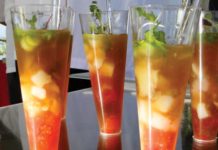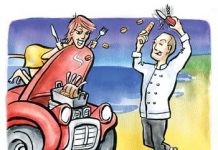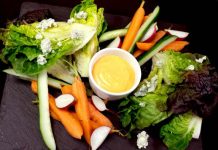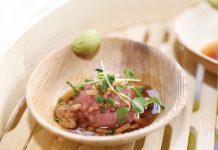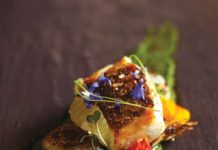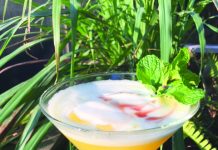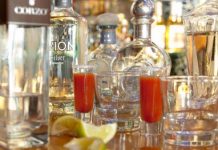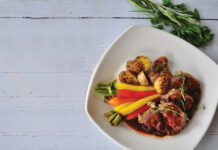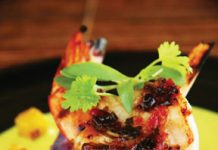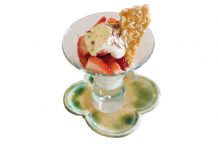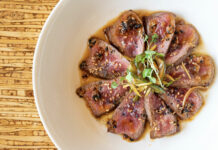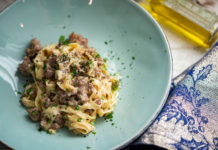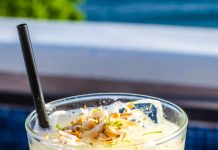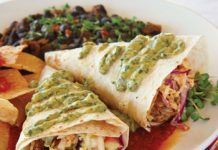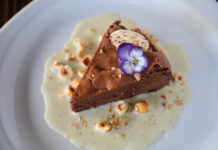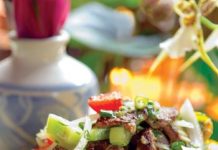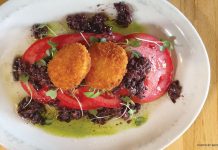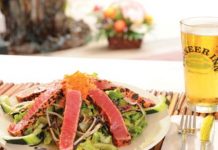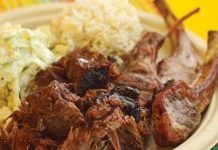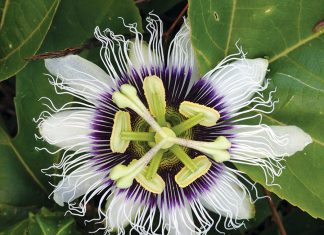Story by Gossip Gourmet | Illustration by Guy Junker
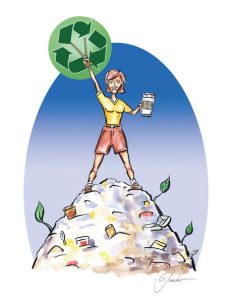 Next time you slurp down a steaming bowl of saimin with the assistance of wooden chopsticks, chew on this: your splintery utensil was once a living, breathing tree. China fells as many as 25 million trees each year to supply the world with disposable chopsticks, deforesting its countryside while loading landfills across the globe—including that little old landfill in Central Maui.
Next time you slurp down a steaming bowl of saimin with the assistance of wooden chopsticks, chew on this: your splintery utensil was once a living, breathing tree. China fells as many as 25 million trees each year to supply the world with disposable chopsticks, deforesting its countryside while loading landfills across the globe—including that little old landfill in Central Maui.
If our towering garbage heap, nicknamed “Mount Opala” (trash), is any indication, Maui is suffering from a bad case of indigestion. Disposable food packaging is just too much for our island ecosystem to swallow. Fellow foodies, let’s face it: the heyday of the Styrofoam clamshell has passed. In celebration of MNKO’s annual Environmental Issue, let’s applaud Maui’s growing army of “eco-gourmets”—those savvy folks who balance maximum taste with minimum waste.
“We reuse or recycle almost everything,” says Elizabeth Soloff at Café Chocolat in Pa‘ia.
“We just don’t make trash.” Well, almost none. Food waste is composted and most everything else is recycled. As proof, she holds up a tiny trash bin she empties less than once a week. Customers attempting to order java to go at the hip new café might as well make themselves comfortable. Elizabeth’s husband, Stuart, employs a rather sneaky waste-reduction strategy, luring customers with riveting intellectual conversation. They stay for an hour or more, thereby foregoing their need for a paper cup. (Recycled paper cups are available for those who insist.)
Whale-watchers onboard Pacific Whale Foundation (PWF) boats don’t have to panic if their cups bloweth over—they’re made from 100 percent biodegradable cornstarch, as are the trash bags. The meals recently got an eco-makeover as well. Red pepper pasta took the place of the meat entrée at dinner and garden burgers replaced the mahi burgers at lunch. (There is something slightly prehistoric, after all, about paying to watch the pretty fish while snorkeling, then climbing aboard to eat them.) The odd-shaped cutlery found on PWF vessels (and at Maui Tacos restaurants islandwide) is another stab at recycling resources. It’s made out of bagasse, a sugar-cane byproduct. At present, it’s imported from (you guessed it) China—via a certain environmentally sensitive café owner.
Marc Aurel Café & Wine Bar wins the eco-gourmet grand prize hands-down. Earlier this year, the Wailuku hot spot hosted a “Biodegradable Art Show” in celebration of its new status as Hawai‘i’s second Certified Green Restaurant™. Café owner Marc Aurel earned the certification by committing to numerous earth-friendly practices, including conserving water and energy; using chlorine-free, nontoxic cleaners; educating employees; and replacing any Styrofoam on the premises. Aurel took his duties a step further and became the islandwide distributor for the aforementioned biodegradable cups, bags, and utensils. (Learn more about the Green Restaurant Association’s certification at www.dinegreen.com)
Meanwhile, environmentally conscious schoolkids in Japan are responding to the threat of a nationwide shortage of waribashi (disposable chopsticks). Students have started “bring your own” campaigns at school, advocating a ban on disposables. Personalized chopstick cases may just be the hottest new accessories to come out of Tokyo this year. (Never fear, your dutiful Gossip has already located the hippest sticks on the net. Get yours at www.to-goware.com and www.japonaji.com/chopsticks.html).

